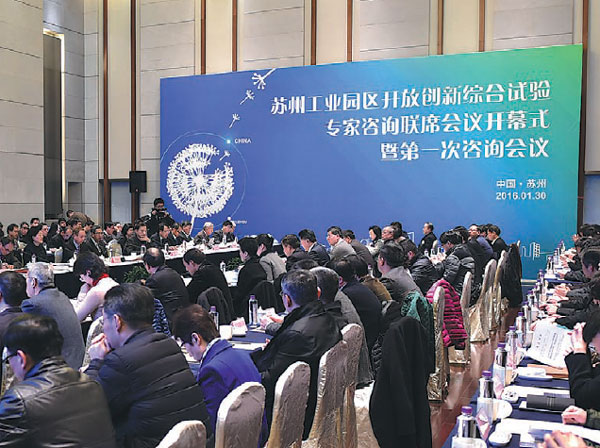Industrial park aims to continue progress
|
The China-Singapore Suzhou Industrial Park is looking to cultivate local professionals to continue the park's development. Photos Provided to China Daily |
The China-Singapore Suzhou Industrial Park launched an advisory meeting of experts on Jan 30 to focus on strategies to develop innovations and talent and look for ways to upgrade manufacturing and services.
The advisory board of 18 experts also discussed economic growth ideas, social reforms, results of cultural and community studies in China and shared their opinions on governance in the industrial park.
Ma Xiuhong, former vice-minister of the Ministry of Commerce and chairwoman of the advisory board, said the 22-year-old industrial park is one of the fastest developing and most successful parks because it has overcome its difficulties through innovations.
Yang Zhiping, director of the SIP administrative committee, said the park has boosted economic growth by implementing national strategies such as the Belt and Road Initiative, and reforms in manufacturing and the supply of resources.
"Attracting talents from home and abroad and training local talents to meet innovation goals and reforms are essential to the development of the industrial park," said Yang.
Jia Kang, director of the Research Institute for Fiscal Science at the Ministry of Finance and a member of the advisory board, said new policy changes for professionals in SIP can become attractive incentives for talents who wish to pursue work in more capital-driven and innovation-driven projects.
"In the past, policymakers often offered hukou (household registrations) or a free apartment and funds to imported researchers or scientists. But today, talented professionals, if given proper on-the-job training, will become as important as imported talents," said Jia.
A recent survey by the China Academy of Personnel Science of more than 16,000 professionals in the industrial park, only about 10 percent of the industrial park's GDP is funneled toward human resources programs, a greater ratio compared to Beijing (6.1 percent) but far less when compared to the world's most developed cities, such as New York (24.1 percent) and London (15.2 percent).
Yang Baojun, vice-president of the China Academy of Urban Planning and Design, said a detailed demographic survey of the 1.1 million residents in the park is needed to determine what kind of housing, consumer services, entertainment outlets are needed in the park and how it can turn a destination for work into a "homeland".
"A public space for professionals in the city to 'mingle' where they can turn startup ideas into a reality will significantly help the birth of innovations," said Yang.
wuyiyao@chinadaily.com.cn
(China Daily 02/03/2016 page12)















